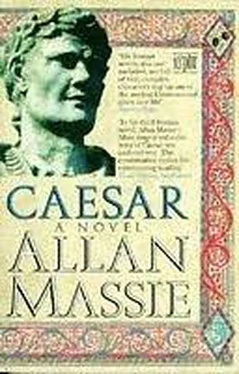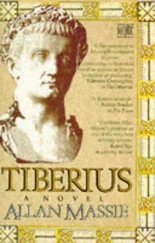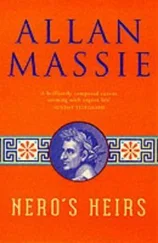Allan Massie - Caesar
Здесь есть возможность читать онлайн «Allan Massie - Caesar» весь текст электронной книги совершенно бесплатно (целиком полную версию без сокращений). В некоторых случаях можно слушать аудио, скачать через торрент в формате fb2 и присутствует краткое содержание. Жанр: Исторические приключения, на английском языке. Описание произведения, (предисловие) а так же отзывы посетителей доступны на портале библиотеки ЛибКат.
- Название:Caesar
- Автор:
- Жанр:
- Год:неизвестен
- ISBN:нет данных
- Рейтинг книги:3 / 5. Голосов: 1
-
Избранное:Добавить в избранное
- Отзывы:
-
Ваша оценка:
- 60
- 1
- 2
- 3
- 4
- 5
Caesar: краткое содержание, описание и аннотация
Предлагаем к чтению аннотацию, описание, краткое содержание или предисловие (зависит от того, что написал сам автор книги «Caesar»). Если вы не нашли необходимую информацию о книге — напишите в комментариях, мы постараемся отыскать её.
Caesar — читать онлайн бесплатно полную книгу (весь текст) целиком
Ниже представлен текст книги, разбитый по страницам. Система сохранения места последней прочитанной страницы, позволяет с удобством читать онлайн бесплатно книгу «Caesar», без необходимости каждый раз заново искать на чём Вы остановились. Поставьте закладку, и сможете в любой момент перейти на страницу, на которой закончили чтение.
Интервал:
Закладка:
"Well, some of it," he said.
"So it's a game."
"It's interesting to hear how you explain it. And I do want to know about Caesar, and why you followed him until… And these women. I've heard of the Queen of Egypt. Men say she's ravishingly beautiful."
"Cleopatra? No, she's not that. She's more interesting than that."
"Tell me about her."
CHAPTER 3
Most Romans loathe Egypt and the Egyptians. There is something about the place that disturbs us. It is, I think, on account of the ever-present consciousness of magic. Everything seems to come from the primeval slime of the Nile. The Egyptians worship animal gods, and one cult, I have been informed, expresses devotion for a dung-beetle. A stench of corruption pervades the country, and few Romans manage to get through a day without looking nervously over their shoulder or seeking reassurance that some witch has not cast a spell on them. It is foolishness, but it is infectious foolishness. Even Mark Antony was affected. He displayed a nervous anxiety which was foreign to his nature.
It is something to do with the landscape. Even though Rome is so great a city, we Romans are by instinct and inheritance country-dwellers. We are comforted by trees, mountains, rivers, lakes, and the sea. Our rivers are friendly things compared to the brooding presence of the Nile. We are happiest, and most at ease, in our country villas. The gods of our country districts are friendly beings; every grove and spring has its tutelary spirit, and it is easy to live in harmony with such beings: easy and pleasant. There is no country, no landscape, in Egypt: instead, a waste of sands interrupted only by monuments to the dead. We Romans have a proper reverence for our ancestors, and proudly display the masks of those who have achieved renown in the service of the Republic. The Egyptians, intoxicated by the idea of death, abase themselves before the wary spirits of their dead. The land is in thrall to the idea of death.
Of course, Alexandria is a great city, the most wonderful in the world. Alexandria, being Greek in its foundation, is not characteristic of Egypt: with its libraries, law-courts, miles of warehouses, harbours busy with the shipping of all nations of the civilised world, there is much to delight, little — it might seem — to dismay the visitor. Yet, even Alexandria has been infected by the poison of Egypt. There was an old woman in the marketplace who was said to be two hundred years old; she sold magic potions to ensure longevity. My cousin Marcus Brutus wished her to be prosecuted for fraud; Caesar only laughed. "She does no harm," he said; erroneously. Our arrival was horrid.
After the victory at Pharsalus, where Pompey's chief army was utterly destroyed, the Great One had fled to Egypt. The country is of course nominally independent, but Roman influence has long been considerable there, and Pompey had formerly championed the cause of King Ptolemy when he was driven out of his country by rebels. Ptolemy had come to Rome, where Pompey had spoken for him in the Senate, and the King had employed lavish bribery to win still more support; he had further contrived to assassinate various members of the opposing party who had also come to Rome to plead their case. No Egyptian thinks anything of assassination, and it was said that the King's success in this enterprise regained much of the respect which he had lost. Even so, he was not successful in his main endeavour, for at that time Pompey had many enemies himself in the Senate, who feared that the restoration of Ptolemy by Roman arms would only add to Pompey's power, since Ptolemy, understanding little about our Constitution, would feel indebted to the Great One rather than to the Senate. So nothing was done on his behalf, until, as a result of the famous meeting between Pompey, Caesar and the millionaire booby Marcus Crassus at Lucca, the three of them formed what Cicero (in private) described as "a criminal conspiracy to share sovereignty and dominate the Republic". Then, as a result of their new ascendancy, Pompey's policy was put into practice, and Gabinius was ordered to lead his army from Syria and restore King Ptolemy. This he did, for he was an efficient officer, despite being also a habitual drunkard; and in any case the Egyptian army was no match for Roman legions. King Ptolemy was now dead, but had been succeeded by his two children, a boy also called Ptolemy, and a daughter Cleopatra.
In the Egyptian fashion, these were married to each other. It is very strange. As you may know, the Egyptian royal family is really Greek, the first Ptolemy having been one of Alexander the Great's generals, but they have so far adapted themselves to the base customs of the country they rule as to be quite happy to practise incest. Normally Greeks, however degenerate, are as averse to incest as we Romans are. The prohibition of incest is apparently of great antiquity, and I would have thought it innate in mankind; and yet the Egyptians appear to find it natural. Certainly they take no exception to it.
Marriage did not, however, appear to exclude the rivalry which one generally finds when there are two contenders to a throne — you know how common such rivalry is in Gaul, Artixes — and the young Ptolemy and Cleopatra were said to be on such bad terms with each other (no doubt fomented by partisans) that there were even rumours of civil war.
At any rate Pompey fled to Egypt confident that the heir of Ptolemy would show gratitude to the man who had re — established his father on the throne. Perhaps he forgot that the Ptolemies were now Orientals, and therefore unacquainted with that noble sentiment.
Caesar was slow in pursuit, for reasons which I could not fathom and which he did not trouble himself to explain. Instead of following Pompey directly, he delayed, and made a diversion to Troy. I was among those whom he chose to invite to accompany him.
Naturally, even though I was alarmed by his procrastination, which I feared would allow Pompey to reassemble an army and thus prolong the civil war, even perhaps reverse its course (perhaps Caesar had information which he denied me), I was honoured to be chosen, and delighted to have the opportunity to see Troy. My mother had instilled a love of Homer in me from my earliest boyhood, and of the two great epics, it has always been the Iliad to which I responded most warmly.
My first feeling was of disappointment. Little remains of the proud towers and mighty ramparts. The scene is melancholy, the famed Scamander sluggish. Mount Ida was invisible, veiled in mist. A chill wind blew from the sea. There were mud-flats and rushes where the Greeks had camped.
"Ten years to capture this," Trebonius said. "Homer's Greeks must have been rare incompetents."
Trebonius always had a habit of looking down his nose at the world. Now he sneered, "And Agamemnon, Ajax and Achilles rare boobies."
"You think so?" Caesar said.
"Well, don't you, General? When you think of what you yourself achieved at Avaricum and Alesia, Troy looks small beer, a wretched place that wouldn't detain us seven days."
"You are right of course, Trebonius." I could see that Caesar was annoyed. He was flexing his fingers as was his habit when he strove to control his irritation. "With command of the sea, with modern siege weapons and a trained army, we would have made short work of these poor Trojans. Is that your opinion also, Mouse?"
Unlike Trebonius, I was responsive to Caesar's moods. I remembered how he loved to boast of his descent from Venus; I recalled that it was in those groves of oak and chestnut above Troy that she had coupled with Anchises, and given birth to the hero Aeneas, who later, guided by his mother and the other gods, escaped the burning city and sailed by slow and arduous stages to Italy, taking with him his little son lulus, from whom Caesar claimed direct descent, though all true Romans are the children of Aeneas. And so I said:
Читать дальшеИнтервал:
Закладка:
Похожие книги на «Caesar»
Представляем Вашему вниманию похожие книги на «Caesar» списком для выбора. Мы отобрали схожую по названию и смыслу литературу в надежде предоставить читателям больше вариантов отыскать новые, интересные, ещё непрочитанные произведения.
Обсуждение, отзывы о книге «Caesar» и просто собственные мнения читателей. Оставьте ваши комментарии, напишите, что Вы думаете о произведении, его смысле или главных героях. Укажите что конкретно понравилось, а что нет, и почему Вы так считаете.












